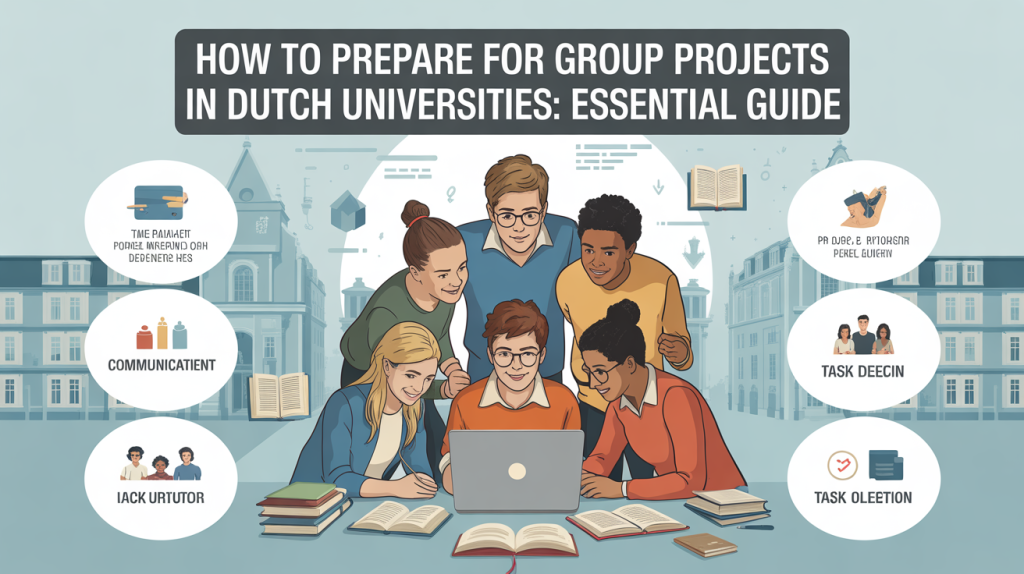How to Prepare for Group Projects in Dutch Universities: A Comprehensive Guide for International Students and Education Professionals
Why Group Projects Matter in Dutch Higher Education
Group projects in Dutch academic programs are more than just assignments—they are a vital learning tool. Universities stress collaborative research, effective communication, and joint problem solving, all of which are reflective of professional, cross-cultural work environments students will encounter post-graduation.
For institutions, group projects are an important metric in assessing students’ abilities around:
- Problem-solving and critical thinking
- Communication and interpersonal skills
- Time and project management
- Adaptability in diverse team settings
Recognizing this, international recruiters and educational agencies can better prepare students for these collaborative challenges, enhancing their chances of academic success and positive university experiences.
Key Steps to Prepare for Group Projects in Dutch Universities
1. Familiarize Yourself with Institutional Guidelines and Expectations
Before diving into any group project, it is critical for students and admissions counselors alike to understand the specific requirements set by the university or faculty. Preparation begins with:
- Reviewing official project guidelines: These often outline proposal submission processes, the requisite approval stages by supervisors or Boards of Examiners, and deadlines.
- Understanding grading criteria: Assessment often involves evaluating students’ attitude, motivation, quality of contributions, report writing, and oral presentations.
Knowing these parameters upfront reduces missteps and increases the likelihood of smooth project progression.
2. Effective Project Planning and Role Assignment
Successful group projects hinge on clear planning and delegation. Early engagement among group members should focus on:
- Assigning roles according to skills and interests: This balances workloads and maximizes each member’s strengths.
- Establishing a meeting schedule: Regular check-ins keep the team aligned, address challenges promptly, and maintain momentum.
Organized planning not only improves output quality but also models project management skills valued by future employers.
3. Foster Clear Communication and Collaboration
Effective communication is paramount to avoid misunderstandings and ensure accountability. Groups should:
- Use university-recommended tools for document sharing, messaging, and video conferencing.
- Maintain transparent communication channels for sharing feedback and updates.
- Embrace open dialogue and constructive criticism to adapt to project developments positively.
By leveraging technology and interpersonal skills, teams can navigate cultural and linguistic differences more successfully, enhancing group cohesion.
4. Engage Proactively with Supervisors and Mentors
Ongoing interaction with assigned supervisors or examiners plays a critical role, especially in research or business internship projects embedded within the curriculum. Supervisors provide:
- Guidance on content, structure, and academic standards
- Feedback on draft reports and presentation preparation
- Support in managing challenges related to project scope or team dynamics
Maintaining a professional and receptive relationship with supervisors benefits both project quality and student learning outcomes.
5. Prepare Deliverables Thoughtfully: Reports and Presentations
The final phases of the project are crucial for demonstrating learning and collaboration. Students should:
- Discuss and agree on the report format with supervisors before writing begins. Common sections include an abstract, plain language summary, introduction, methodology, results, discussion, conclusion, and references.
- Allocate presentation responsibilities so each member is prepared to discuss their contribution.
- Practice delivering the presentation collectively to ensure clarity and confidence during the actual session.
Attention to detail in both written and oral deliverables positively impacts grades and offers valuable experience in scientific communication and public speaking.
Practical Tips for International Students Working on Group Projects
While Dutch universities prioritize collaborative learning, international students may face additional challenges relating to cultural differences and academic expectations. To navigate these successfully, students should:
- Respect diverse viewpoints and communication styles within the group.
- Participate actively and confidently in discussions and meetings.
- Utilize available university support resources such as student mentors, writing centers, and project guidelines.
- Seek advice early if challenges arise, minimizing last-minute issues.
These approaches help international students integrate smoothly into academic teams and make the most of the multicultural learning environment.
Why Study in Netherlands is Your Partner in Group Project Success
At Study in Netherlands, we leverage our leadership in international student recruitment and education expertise to support students and universities alike. Our platform offers:
- Comprehensive guidance on Dutch academic culture, including group project preparation and expectations.
- Automated tools and resources assisting students in understanding university requirements, organizing workflows, and improving communication.
- Dedicated support for HR and marketing professionals in education to tailor recruitment strategies that emphasize readiness for collaborative academic experiences.
By connecting students with in-depth, tailored support, Study in Netherlands maximizes both academic outcomes and overall satisfaction.
Summary: Essential Group Project Preparation Steps
| Preparation Step | Key Actions |
|---|---|
| Understand Guidelines | Review project rules and grading criteria |
| Plan Collaboratively | Assign roles, set meetings, and define timelines |
| Communicate Clearly | Use recommended tools; maintain open feedback |
| Liaise with Supervisor | Engage regularly for advice and approval |
| Prepare Deliverables | Follow report formats; rehearse presentations |
Take the Next Step with Study in Netherlands
Preparing for group projects in Dutch universities requires strategic planning, clear communication, and the ability to work effectively in diverse teams. For education professionals and international recruiters, empowering students with this knowledge can dramatically improve study outcomes and satisfaction.

